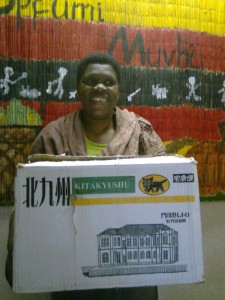A woman’s place is in politics
Thursday, August 12th, 2010 by Delta NdouI used to be one of those women who would turn her nose up whenever politics was brought up thinking, “what a waste of time, I’ll focus on gender issues and advancing the interests of women.”
I have had occasion to change my mind about politics and the discourses of governance and decision-making in the highest echelons of power.
In fact, I would go so far as to say I have set my mind firmly on pursuing politics as an overarching goal in my activism career.
Once I realized the influence that politics has on my life and its bearing on the choices availed to me as a woman, as a youth and as an African, I became convinced that being a woman must of necessity require one to be a politician.
I figure if politics determines what I can afford to eat, what kind of bed I can sleep on, what kind of shelter I can call home, what kind of lifestyle I can lead (power-cuts, water-rationing and all) – if politics can impact on what kind of clothes I can afford to wear or the kind of educational and career opportunities availed to me – then clearly politics is exactly where my head needs to be and precisely where my heart should set its sights.
If politics determine what kind of future my children will have or the kind of road I must travel on daily and the texture of my journeys (bumpy dusty roads, potholes and all) then I figure politics is exactly where I need to be.
If politics will determine which embassy will shut its door in my face, if politics can deny me the chance to see the world beyond the borders of my nation, if politics has the power to detain me within the confines of my continent – then to change the narrative of my life and to exceed the limitations imposed by my nationality (tainted by bad governance, skewed politics and all); I must delve into politics.
If politics determine what laws will govern my conduct and which laws will legitimize my oppression – then by all means I must become a politician to change the status quo from within and not from without.
If politics can give immense power to a minority and perpetuate the discrimination and marginalization of certain sects of society – then I should be a politician to use the same vehicle to turn the tide of social injustice.
If politics can determine the quality of my life and my fate when I ail (no drugs in hospitals and no health personnel and all) as well as the kind of burial I am likely to get from my well-meaning but financially stunted nearest and dearest – then politics is my business.
If politics determines my diet, keeping the best brands just out of my reach so that I have to be content with the ‘no-name’ average products (with local industry struggling and all) then clearly, politics is where I need to be.
If politics influence the kind of security afforded to me and my property as a citizen (with underpaid cops and corruption being the order of the day) then I have to be a politician or be doomed to a life lived according to the dictates of others.
If politics gives one the voice, to speak on behalf of others then politics is my kind of brew – for no one speaks for me; I will speak for myself and if need be, I will speak for those on the receiving end of life’s endless tragedies and political intrigues.
A woman’s place is in politics. A woman’s business is to shape a tomorrow brighter than our own past and greater than our present circumstance.
So I sold my soul to the ‘dirty’ game of politics for if it is a game then I refuse to be a casualty, a pawn and a bystander caught in the middle and paying the price for decisions made without my consent or footing the bill for events sanctioned without my permission.
So hear me when I say, politics is my business for I would rather pay the price of being one than suffer the penalty of standing on the sidelines while others recklessly play God with my life.










